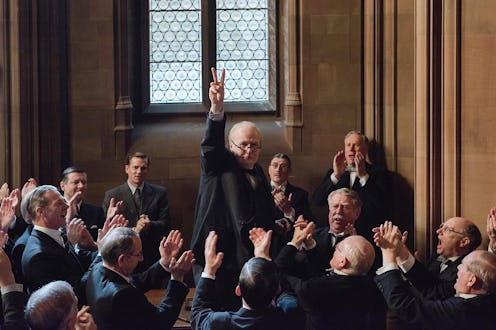
Although it ended over 70 years ago and few of the veterans who took part in it remain alive today, World War II remains a subject of fascination for many, which results in prestige films being produced about the war seemingly every year. 2016 saw the release of Hacksaw Ridge, which earned some Oscar nominations, and this year's Dunkirk is expected to fare even better at the Academy Awards. The next film to take on WW II is Darkest Hour, and it's a little different in that it doesn't focus on soldiers, but on Britain's prime minister at the time, Winston Churchill. But how accurate is Darkest Hour?
It's fairly accurate, but definitely adds some Hollywood flourishes to ramp up the drama. The film specifically delves into a particular time in Churchill's tenure, hence the title, and deals with his decision to proceed in the war with Germany. At the time, the Germans were offering to negotiate for peace, and the UK's forces were stranded on the beach at Dunkirk (watch Dunkirk for a reasonably accurate portrayal of what happened there), so it appeared that Britain would be forced to surrender to the Nazis, allowing the rest of Europe to fall under Nazi rule along with it. Thankfully, Churchill managed to convince his country to fight on and they ultimately triumphed in the war, but Darkest Hour does take a few liberties with how he actually went about doing that.
The film deals mostly with the War Cabinet Crisis of May, 1940. Churchill was appointed wartime prime minister on May 10 by King George VI after the government lost confidence in current prime minister Neville Chamberlain's handling of the war and convinced him to resign. That same day, Germany invaded Belgium, the Netherlands, and France, which led to the bulk of Britain's forces becoming stranded on Dunkirk. Shortly afterward, Britain's foreign secretary Viscount Halifax began talks with Italy about accepting an offer of armistice from Germany. Halifax's desire for the armistice, versus Churchill's desire to continue fighting the Nazis, led to a conflict in the War Cabinet at the end of that May, resulting in a number of meetings where the two men each attempted to win over the rest of the cabinet to their own cause. The cabinet convened nine times in three days, and near the end of the meetings Churchill met with the 25-person Outer Cabinet and gave an impassioned speech in defense of continuing the war, rousing the support of the government overall and forcing the War Cabinet to take his position to fight on. A few days later, he gave his famous "We Shall Fight on the Beaches" speech to Parliament, galvanizing the nation behind his cause. The movie deals with all of this in a mostly accurate way, but there is a big dollop of Hollywood exaggeration included.
In the film, before giving his speech before Parliament, Churchill takes a ride on the London Underground to talk to some everyday people about what Britain should do when it came to the Nazis: Fight or surrender. The people overwhelmingly tell him to fight, giving him essentially a public mandate to take back to his colleagues in the government and inspiring him to deliver the speech that saved Britain. This fateful subway ride never actually occurred though, according to Peter Travers of Rolling Stone, and it appears to be the film's biggest piece of outright fiction.
In spite of that and other small fibs, however, the movie is still largely accurate overall, at least when it comes to the sequence of events that took place, and that comes from screenwriter Anthony McCarten's (who also penned the 2014 Stephen Hawking Biopic The Theory of Everything) longtime admiration of Churchill. "We aim to present a Churchill you haven’t seen before, a new portrait that shows all his famous strengths but also adds new dimensions, such as the grave doubts he privately harbored, the dark moods that would seize him unexpectedly and his fear of failure, a driving force that is often is left out of any discussion of the man," the screenwriter told Deadline.
Darkest Hour isn't wholly true, but few biopics are. Still, if you're looking for a reasonably accurate account of Winston Churchill's tumultuous early days as Great Britain's prime minister, you could do a lot worse than this film.